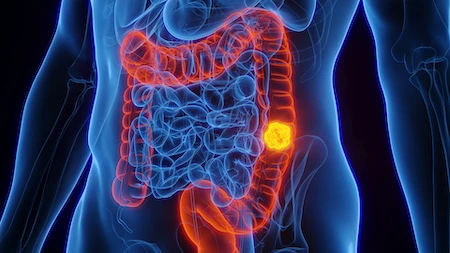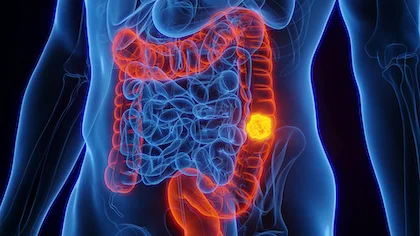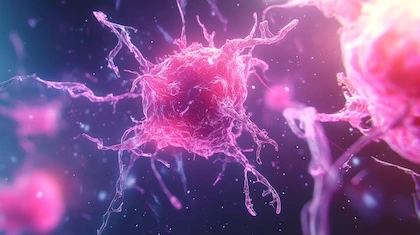
Colon Cancer Treatment in Germany

We organize the best clinic for colon cancer treatment in Germany
If you got the diagnosis for colon cancer, we believe colon cancer treatment with immunotherapy for example with dendritic cells can help. However, read what we recommend given from our to experts for dendritic cell therapy.What is Colon Cancer?
Colorectal cancer (CRC) is a type of cancer that begins in the colon or rectum, both of which are parts of the large intestine. It typically starts as benign growths called polyps, which can eventually become cancerous if not removed. Colon cancer is one of the most common types of cancer globally, affecting millions. According to the World Health Organization, around 1.9 million new cases of colon cancer are diagnosed annually worldwide.The most common type of colon cancer, which accounts for over 95% of all cases. Adenocarcinomas originate in the mucus-producing glands lining the colon and rectum. Read more here about: Colon Cancer.
The exact cause of colon cancer is not always clear, but risk factors include age, family history, diet high in red or processed meats, obesity, and sedentary lifestyle. Chronic conditions like inflammatory bowel disease (IBD), smoking, and heavy alcohol use also increase the risk.
What opinions for the treatment of colon cancer are available in Germany?
Germany offers a comprehensive range of treatment options for colorectal cancer (treatment of colon cancer), leveraging advanced medical technologies and highly specialized healthcare professionals. Treatment in Germany is based on the stage of the cancer, the patient’s overall health, and other individual factors. Here are the primary treatment options:1. Surgery
Surgery is the cornerstone of colon cancer treatment in Germany, especially for early-stage cancer. There are various types of surgeries:
– Polypectomy: For small, early-stage polyps, which are removed during a colonoscopy.
– Colectomy: Removal of part or all of the colon. In some cases, this is done laparoscopically (minimally invasive).
– Lymphadenectomy: Removal of nearby lymph nodes to prevent spread.
2. Chemotherapy
Chemotherapy is commonly used to target cancer cells, either after surgery (adjuvant therapy) to reduce recurrence or in advanced stages to control tumor growth. Germany’s oncology centers utilize state-of-the-art chemotherapy regimens, often tailored to the genetic profile of the tumor.
3. Radiotherapy
Radiation therapy is more commonly used for rectal cancer but may be applied in colon cancer cases if the tumor has invaded nearby tissues. Advanced radiation technologies, such as IMRT (Intensity-Modulated Radiation Therapy), are used to target cancer cells while minimizing damage to healthy tissue.
4. Targeted Therapy
In advanced or metastatic colon cancer, Germany employs cutting-edge targeted therapies that focus on specific genetic mutations in cancer cells, such as VEGF or EGFR inhibitors These drugs inhibit cancer cell growth and spread.
5. Immunotherapy
Immunotherapy is used in cases with mismatch repair-deficient (dMMR), micro-satellite instability-high (MSI-H) tumors and denritic cell therapy (DCT). These therapies enhance the immune system’s ability to fight cancer.
Germany also excels in offering personalized treatment plans through genomic profiling and cutting-edge diagnostic techniques, providing a tailored approach to each patient. For example, Dendritic cell therapy is such personalized treatment option in Germany.
Immunotherapy for colon cancer is an innovative treatment that harnesses the body’s immune system to identify and destroy cancer cells. Unlike traditional treatments like chemotherapy, which targets all rapidly dividing cells, immunotherapy works more precisely by helping the immune system recognize cancer as a threat. This is particularly beneficial for some colorectal cancer (CRC) patients, especially those with specific genetic profiles. Here’s a detailed look at how immunotherapy works and the options available for colon cancer.
How Immunotherapy Works for Colon Cancer
The immune system naturally protects the body against diseases, including cancer. However, cancer cells often develop mechanisms to evade immune detection. Immunotherapy aims to overcome these obstacles by activating the immune system or enhancing its ability to fight the tumor. There are several types of immunotherapy approaches used for colon cancer:Checkpoint Inhibitors: These drugs block proteins that prevent the immune system from attacking cancer cells. Tumors can produce proteins like PD-L1 or CTLA-4, which suppress immune response. Checkpoint inhibitors disable these proteins, allowing immune cells (T-cells) to attack the tumor.
Cancer Vaccines: Therapeutic vaccines boost the immune system’s ability to target cancer cells. Unlike preventive vaccines (e.g., for infections), cancer vaccines are designed to treat existing cancer by stimulating an immune response against tumor-associated antigens.
Monoclonal Antibodies: These are laboratory-made molecules that mimic immune system antibodies. They bind to specific proteins on cancer cells or immune cells to enhance immune response or block tumor growth signals. Some monoclonal antibodies are checkpoint inhibitors, while others target specific mutations in colorectal cancer cells.
CAR-T Cell Therapy: Although not yet widely used in colon cancer, this experimental approach modifies a patient’s T-cells to recognize and attack cancer cells directly.
Immunotherapy Options for Colon Cancer in Germany
The use of immunotherapy in colon cancer is often tied to specific genetic mutations in the tumor. Not all colon cancer patients benefit from immunotherapy, but certain subtypes do respond well. Here are the key immunotherapy treatments for colon cancer:1. Checkpoint Inhibitors
Pembrolizumab (Keytruda): This immune checkpoint inhibitor targets PD-1, a protein that suppresses immune response. It is approved for colon cancer patients whose tumors are microsatellite instability-high (MSI-H) or mismatch repair-deficient (dMMR), indicating a higher likelihood of mutation. Pembrolizumab helps the immune system detect and attack the tumor. It is particularly effective in patients with metastatic colorectal cancer.
Nivolumab (Opdivo): Another PD-1 inhibitor, Nivolumab is approved for use in MSI-H/dMMR colorectal cancer. It can be used alone or in combination with another immunotherapy drug, ipilimumab, for advanced cases where other treatments have failed.
Ipilimumab (Yervoy): This is a CTLA-4 inhibitor used in combination with Nivolumab. It blocks CTLA-4, another checkpoint protein, allowing the immune system to mount a stronger attack on cancer cells.
2. Combination Therapy
Combining checkpoint inhibitors like Nivolumab and Ipilimumab has shown promising results in advanced colon cancer. This dual blockade enhances immune activity by targeting multiple immune-suppressing pathways.
3. Emerging Therapies and Trials
Several clinical trials are exploring the combination of immunotherapy with chemotherapy, radiation, or targeted therapies. These studies aim to improve response rates in patients whose tumors do not respond to immunotherapy alone.
Adoptive T-cell therapy, which involves enhancing a patient’s T-cells in the lab before reintroducing them to the body, is another exciting area of research, though it’s not yet widely available for colon cancer.
Who Benefits Most from Immunotherapy?
Immunotherapy is not universally effective for all colon cancer patients. Its benefits are most pronounced in those whose tumors have certain genetic characteristics, such as:
MSI-H or dMMR tumors: These tumors have high levels of genetic mutations, making them more recognizable to the immune system and more responsive to immunotherapy.
BRAF mutations: Some patients with this genetic mutation may benefit from combination therapies that include immunotherapy.
Patients with microsatellite stable (MSS) tumors, which represent the majority of colorectal cancers, typically do not respond well to immunotherapy. However, research is ongoing to find ways to make these cancers more susceptible to immune-based treatments.
Dendritic Cell Vaccination in Germany
Dendritic Cell Therapy is an emerging treatment for colon cancer that uses the body’s own immune system to fight cancer cells. Dendritic cells are a type of immune cell that acts like a messenger, identifying harmful invaders (like cancer) and alerting the immune system to attack. In cancer treatment, dendritic cells are used to help the body recognize and destroy cancer cells more effectively.
How Dendritic Cell Therapy Works
In this therapy, a patient’s dendritic cells are collected and “trained” outside the body in a lab. They are exposed to cancer antigens (substances from cancer cells) to learn how to recognize the cancer. Once they are primed, these trained dendritic cells are injected back into the patient, where they guide the immune system to find and kill cancer cells more efficiently. This approach aims to enhance the immune response specifically against cancer.Positive Clinical Trials for Colon Cancer
Several clinical trials have shown promising results using dendritic cell therapy in colon cancer treatment. For example:A study published in 2018 involved patients with advanced colorectal cancer. Patients received dendritic cell vaccines and showed improved survival rates and reduced tumor size in some cases.
Another trial combined dendritic cell therapy with chemotherapy, showing that the treatment helped activate the immune system and slow tumor growth.
Although the research is still in early stages, these trials suggest that dendritic cell therapy could become an important tool in treating colon cancer, especially when traditional treatments, like chemotherapy, aren’t effective.
Benefits and Challenges
Dendritic cell therapy is personalized, meaning it’s tailored to the individual’s cancer, and it has the potential to cause fewer side effects than traditional treatments. However, it’s still experimental but affordable.
color: #3695eb;Clinical trials with positive results of Dendritic Cell Vaccination in colon cancer
Here are several clinical trials and studies that demonstrate the effectiveness of dendritic cell-based therapies for colon cancer:
The addition of autologous Dendritic Cells-CIK to standard chemotherapy had a positive effect on OS of patients with refractory mCRC, especially those with liver or extra-regional lymph node metastasis
Dendritic Cell Vaccination in Colorectal Cancer Liver Metastases
A Phase II study examined the efficacy of dendritic cell vaccines in patients who had undergone surgery for liver metastases from colon cancer. Patients receiving dendritic cell therapy had longer disease-free survival compared to those receiving standard treatments. This trial shows that dendritic cell vaccines may reduce relapse rates in metastatic colon cancer.
Allogeneic Dendritic Cell Vaccines in Advanced Colorectal Cancer
Another trial explored dendritic cell vaccines pulsed with melanoma cell lysate for advanced colorectal cancer patients. The results indicated significant immune responses and potential clinical benefit in certain subgroups of patients.
Dendritic cell-based cancer immunotherapy for colon cancer
Therefore, alternative strategies, such as immunotherapy for colon cancer, are needed for patients with advanced CRC. This review summarizes evidence from dendritic cell-based cancer immunotherapy strategies that are currently in clinical trials.
Autologous Dendritic Cell Vaccination for Resected Colon Cancer
This clinical trial focused on preventing relapse after surgical resection of colon cancer. Patients who received dendritic cell vaccines loaded with tumor antigens showed enhanced immune responses and delayed disease progression.
Dendritic Cell Therapy in Combination with Chemotherapy for Colorectal Cancer
An exploratory study combined dendritic cell vaccines with standard chemotherapy, observing improved outcomes in terms of immune activation and tumor shrinkage. This study is a positive indicator that dendritic cell therapy may synergize with traditional treatments to boost efficacy.
These treatment colon cancer current clinical trials demonstrate the potential of dendritic cell therapy to enhance the immune response against colon cancer, especially when combined with other treatments.
push h=”20″]
Promising Treatment of Colon Cancer with Dendritic Cells in Germany
Effective Dendritic Cell Vaccines– Immunotherapy for colon cancerTreatment with dendritic cells in Germany is often used when conventional therapies are unsuccessful or never used. However, this was shown, for example, in the cases of colon cancer, glioblastoma, prostate cancer, kidney carcinoma, and lung cancer. As a result, vaccination with dendritic cells is most promising if there are only a few tumor cells.
Immunotherapy for Colon Cancer in Germany
Immunotherapy, including dendritic cell therapy, is gaining traction as a viable treatment option for colon cancer in Germany. German clinics are known for their rigorous scientific research and advanced clinical trials. Hence patients from around the world come to Germany to benefit from these innovative treatments, which offer hope for better outcomes and improved quality of life.Today, we know that the immune system of patients with a low tumor mass is often still much more efficient than that of patients with a high tumor load. Just like in chemotherapy and radiation, former dendritic cell vaccination begins, the more successful it is. However, to see if you are a candidate for dendritic cell vaccines, forward your medical reports to us: here.
Medical conditions that can be treated by dendritic cell vaccines:
- Breast cancer
- Cervix and Uterus carcinoma
- Lung cancer and lung carcinoma
- Stomach cancer
- Pancreas cancer
- Prostate cancer
- Stomach cancer
Indications that can be treated by dendritic cells – Immunotherapy:
- Glioblastoma
- Sarcomas
- Non-Hodgkin-Lymphom
- Ovarian cancer
- Liver cancer
- Bladder carcinoma
- Colon cancer
How to book a Clinic for Colon Cancer Treatment with Dendritic Cells in Germany?
GermanyHealth provides comprehensive services for international patients seeking advanced colon cancer treatment in Germany. They facilitate access to top-tier hospitals and experienced oncologists, offering treatments like surgery, chemotherapy, and innovative therapies like immunotherapy and dendritic cell therapy.However, GermanyHealth helps patients by managing every aspect of their medical journey, from arranging consultations and treatment plans to handling travel logistics and translation services. Our team ensures personalized care, offering access to cutting-edge medical technologies and tailored treatment strategies, ensuring patients receive the best possible care in Germany.
Request now Dendritic Cell Vaccines and Book later!
Find the best Clinic for Colon Cancer Treatment with Dendritic Cells in Germany.
